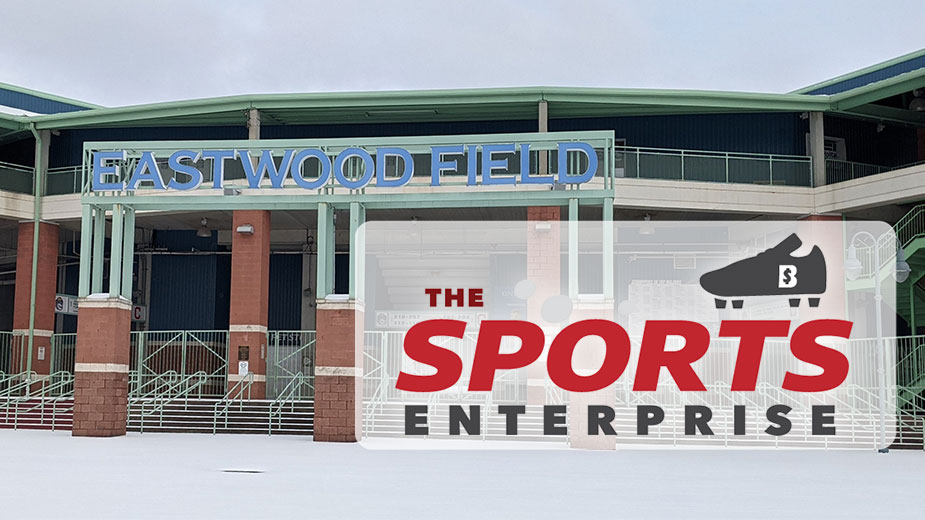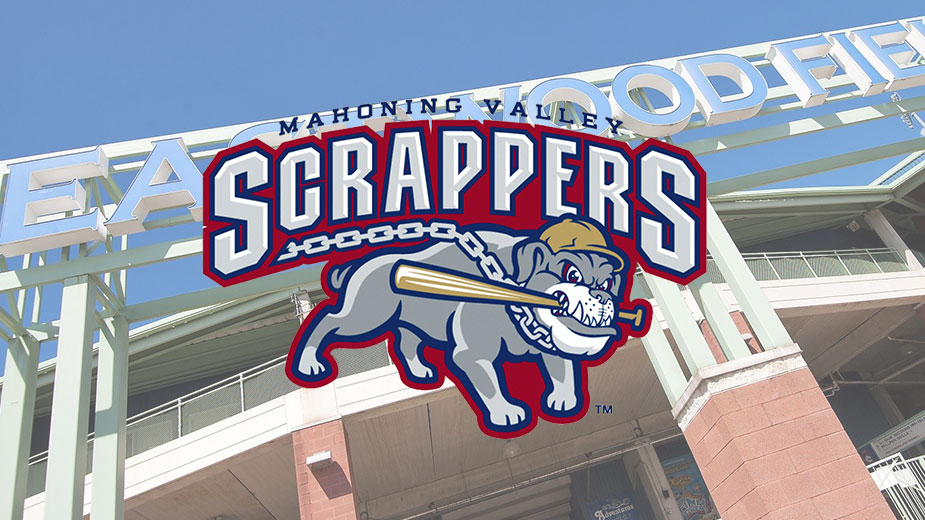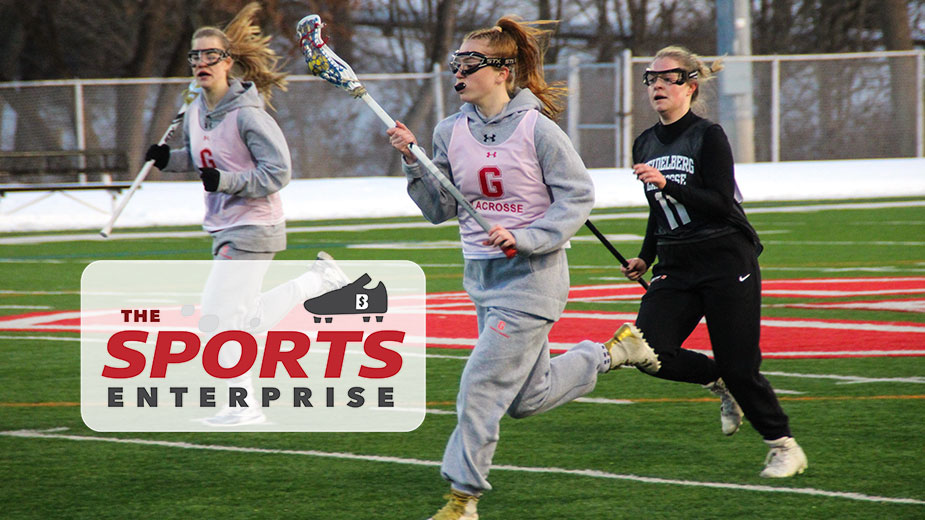Mahoning Valley Scrappers Look to Thrive in New League
NILES, Ohio — Eastwood Field remained vacant in the summer of 2020 as the Mahoning Valley Scrappers lost 95% of its yearly revenue after Major League Baseball told its minor league affiliates it would not supply them with players, effectively canceling the season around the country.
Most of the team’s revenue comes from home games and other local and national entertainment events, says Jordan Taylor, Scrappers general manager and vice president of HWS Group, a Massachusetts-based sports management firm that owns and operates professional sports franchises
“We were fortunate to get through,” Taylor says. “It’s certainly going to be a transition. It’s not going to all come back in one year for us or any of the teams who weren’t able to play. It’ll be a multi-year process, but we’re optimistic.”
The metallic bars protecting Eastwood Field will be open to the public this summer.
The Mahoning Valley Scrappers’ first season as part of the MLB Draft League is set to begin on the road May 24 at the West Virginia Black Bears. The State College Spikes, Williamsport Crosscutters, Frederick Keys and Trenton Thunder are also part of this new league, which features 34 home and 34 away games for each team. The Scrappers’ home opener is May 26 against the State College Spikes. The team’s full schedule can be found HERE.
The Scrappers held amatuer baseball games and other non-baseball events, following the Trumbull County Health District and Ohio Department of Health guidelines from June to October 2020 with limited, socially-distanced fans in its 6,000-seat stadium. The stadium can hold nearly 9,000 for some entertainment events during non-COVID times.

Taylor says Eastwood Field can host up to 900 fans for Youngstown State University baseball and area high school baseball games this spring. He hopes to get a variance from the ODH starting in May to host bigger events such as graduation ceremonies and Scrapper games. Taylor says he’ll know by that time because the Cleveland Indians and other minor league teams in Ohio will be playing games at their respective stadiums. The template for reopening Eastwood Field will be presented to the ODH and the county health district in March.
“It would be great if we could get capacity between 2,000 and 3,000 to start and hopefully increase it as we go along,” Taylor says.
The first 42 games of the MLB Draft league will be played between May 24 and July 8. The league breaks July 9-14 for the MLB Draft to be held July 11-13. Play resumes on July 15, concluding with the championship game on Aug. 15.
Plenty of MLB scouts will congregate at Eastwood Field to view players trying to raise their value prior to the MLB Draft, which consists of 20 rounds. Those collegiate players are usually upperclassmen, about ready to head into the draft. Players spend time in the Appalachian League and Cape Cod Baseball League before heading to the MLB Draft League.
“There’s a lot of motivation for the players to come to play in a unique environment,” Taylor says. “There’s never been a league like this in the history of baseball.”
MLB representatives will be at Eastwood Field the week of Feb. 22 to install technology that will allow all 30 league-wide teams to track the players’ analytics, along with analysis from the scouts in attendance at Eastwood Field. Each of the Draft League ballparks will have this technology.
MLB and Prep Baseball Report will announce the managers in early March, Taylor says, while the players and remainder of the staff will be announced shortly after that time.
The MLB Draft League is different from the short season Class A league of the Cleveland Indians where fans knew first-round draft picks such as CC Sabathia and Francisco Lindor. Taylor emphasizes those in the stands sometimes didn’t realize someone like Jose Ramirez or Cy Young Award winner Shane Bieber had that same potential at the major league level. Those are the kind of players in this new draft league, he says.
MLB Draft League teams have more regional players with draft-eligible players from Kent State University, University of Akron, The Ohio State University and Youngstown State University, Taylor explains, along with homegrown talent from the Mahoning and Shenango Valleys that went to other universities.
People are eager to see this product, he notes, as there has been a steady flow of season tickets and smaller packages sold, comparable to years past. From 2019 to 2020, 97% of the Scrappers’ sponsorship base and more than 80% of ticket holders stayed with the minor league team, despite the uncertainty of the pandemic and possible extinction at the hands of MLB.
“That’s one of the best parts about this community is the corporate support. Ticket support has always been really, really strong,” Taylor says. “It seems like that’s going to carry through.”
Joe Bell, director of corporate communications for the Cafaro Co., says home games usually means a bump in traffic for the nearly 200 businesses on the Eastwood Mall property either before or after the game, which was prior to the pandemic. Cafaro owns the Eastwood Mall complex and Eastwood Field.
“There’s a symbiosis there,” Bell says.
Those coming to the stadium in 2021 can safely attend, Taylor says. Some $25,000 to $30,000 is being spent on cleaning systems, and employees will be focused on keeping restrooms, portable sinks, sanitizing stations and other touch points around Eastwood Field as clean as possible.
The Scrappers are also transitioning into a ticketless system and emphasizing more cashless usage around Eastwood Field to be as paperless as possible, he adds. There will be more delivery systems for concessions, along with pick-up windows.
“A lot of teams will be a little bit more innovative after everything that happened over the last year,” Taylor says.
The Scrappers have six full-time front office employees and look to increase that number to nine or 10 in March or early April. In early May, 15 interns are brought in for a number of roles such as marketing, promotions, design, groundskeeping and concessions.
In total, the Scrappers employs nearly 200, with about 125 focusing on game day, Taylor says.
MLB Draft League teams are responsible for how the business looks, as far as field improvements, which Eastwood Field befalls on the Scrappers. MLB pays the salaries of the coaches and players, provides support for team websites, and supplies analytics and game necessities, like bats and baseballs. The team takes care of travel, hotels and meals. The economic model is similar to what the Scrappers had with the Indians organization.
Bell says the Scrappers booked 750 hotel rooms on the Eastwood Mall property in 2019, a large part of that being visiting teams.
Players still have host families, and some have maintained relationships with former players as far back as 15, 20 years ago, giving players “a sense of home while they are in the area,” Taylor notes.
As the players adapt to a professional life, the league is focusing on non-baseball items, including dietary habits, financial and life skills, as well as literacy and hearing stories from former professional players.
“When they do sign their pro contracts, they’re as ready as they can be to start their career,” Taylor said.
The Scrappers could have joined an independent grouping like the Frontier League or been part of another summer collegiate baseball league. Some minor league teams did not have an option and were eradicated by MLB.
“When Major League Baseball came to us and proposed this new league, we were really excited about it and thought this was the best option for us,” Taylor states.
There’s no wondering if the Scrappers are going to be in existence for 2021. Not having the minor league team around the Mahoning Valley would have had an impact, notes Cafaro’s Bell.
“I think it would have had more of a damaging effect on the entire community psyche because there are some baseball lovers here who are very proud of the fact we have a hometown ball club,” he says.
Copyright 2024 The Business Journal, Youngstown, Ohio.



